Cases
ACCG is a registered charity established in 1983. We aim to provide a caring and supportive service for our service users. We offer a range of care services tailored specifically to the needs of service users who have dementia, supporting them, their families and everyone involved.
Community well-being services within the Claremont Resource Centre provide a friendly, welcoming environment where people can meet up with friends old and new. Service users participate in activities available such as movies, music, board games, art and crafts, flower arranging, gardening, physical activity sessions and digital connections in our warm and comfortable day room to allow service users to socialize. Prompts and minimal assistance is given to the those who struggle to work on their own.
ACCG recognises the importance of multisensory stimulations, which are beneficial to maintain service users’ cognitive abilities. Our Dementia Advisor supports service users in the Aromatherapy Relaxation sessions which stimulate service users’ smell and touch senses. The session can accommodate up to ten participants.
The dementia care and advisory service can be accessed by service users where 1-2-1 sessions are undertaken, providing free confidential advice that assists people to get a dementia diagnosis and access to post-diagnostic support. Our dementia advisor can visit the service users in the community, their homes, the hospital and at the Claremont Resource Centre.
The person-centred care and support for older adults is a highly valued service which recognises varied care needs. This care provision enables Carers to receive the much-needed respite that allows them to continue in their caring roles and remain in employment.
For further Information
https://www.facebook.com/AfricanCaribbeanCareGroup
Dementia Advisor – African Caribbean Care Group
Dementia(at)accg(dot)org(dot)uk
Partners:
- Dementia United (Greater Manchester Integrated Care Partnership’s program for dementia)
- Trafford Council
- Wigan Council
- GreaterSport
- Made by Mortals
- Together Dementia Support
Funding: Dementia United and both Trafford and Wigan councils (boroughs within the region of Greater Manchester with populations of ~250,000 and ~350,000 respectively) combined funding to commission the development of this training package, totalling £30,000.
Background: Striking evidence is emerging which suggests that 40% of cases of dementia may be prevented or delayed through small changes in the way we live our lives. This includes changes to our diet, the way we manage pre-existing health problems and how often we are socially and physically active (https://brain.health/). There is also growing evidence to suggest that art, music and leisure activities can offer physical and psychological benefits to those living with a dementia and their care partners (arts4dementia.org.uk/sp/)
Unfortunately, the COVID-19 pandemic has seen services in the UK placed under significant pressure and individual’s ability to engage in community and leisure activities has been severely impacted. This has taken a tremendous toll on older people and those living with dementia. 25% of COVID-19 deaths in the UK have been people living with dementia and emerging evidence suggests that health and lifestyle changes brought about by the pandemic are increasing the burden on people living with dementia. These health and lifestyle changes also may also increase dementia risk in many individuals not currently living with the condition.
It’s therefore extremely important that we provision support for activities which can improve the health and wellbeing of those living with dementia, while also improving brain health and resilience of our whole population.
Process: Two provider organisations were selected to receive the funding and develop the training package, both bringing complimentary skills and experience to the project.
- Made By Mortals (MbM): are experts at co-creating immersive podcases, films and musical theatre and already had experience of creating similar well received training packages.
- Together Dementia Support (TDS): Are a charity who support people to live actively and positively with dementia. They brough a wealth of knowledge on supporting and co-producing work alongside with people living with dementia and on delivering dementia awareness training.
Made By Mortals have a core group of up to twenty-five over 60-year-olds who they work with every week. A fair number of people in the group have experience of dementia, mild cognitive impairments or of being a carer. Initially, they delivered some development workshops at TDS with carers and people living with dementia and then invited around 6 of them to join their 60s group for the duration of the project. Working in partnership with TDS allowed the MbM team to meet with people living with dementia (and their carers) at groups and venues they were already familiar with. This enabled them to gain valuable ‘real-life’ insight into the challenges people living with dementia are facing, this was also very beneficial to the recruitment of participants for the project, rather than trying to set up something new, and all the challenges that brings.
Sally Ferris CEO of Together Dementia Support said “Members of TDS’s Fab Forgetful Friends activist group were thrilled to have the opportunity to share their personal stories of how they have struggled to stay active. They loved their weekly workshop sessions with Made by Mortals, improvising, experimenting and script writing and reading. It was a new and stimulating experience for them and they would like to continue working with MbM – if the resources can be found to enable their ongoing participation. That very obstacle highlights the need for this training: organisations need to understand that they need funding and commitment to people living with dementia if they want to enable them to stay active and included.”
The process used by MbM to create immersive content comes from a series of creative writing/drama and music making activities that slowly build up into a body of real-life experience and imaginative ideas. These ideas lead to the starting point of the audio piece being a love story about a couple going through a journey that led to them falling back in love post diagnosis, with the dynamic having changed between them. This was a common theme that came out of conversations with people with lived experience.
The audio piece was based on the story of fictional characters as opposed to re-telling any one individual’s story. Everyone who participated in the workshops contributed to building the fictional characters based on their real experiences. Where they live, the friends they’ve got, what they do with their time, the clothes they wear, every aspect of them. This allowed people participating in the creation to share as much or as little of their own experiences as they wanted and to build this onto the fictional main characters. By creating the work in this way, it also meant that everybody who helped make the character, can relate to him/her.
From this the script was formed and then went through a process of back and forth with the group to nail down the final recording draft. Music for the piece was also co-created with the group – the music plays the role of dementia and love in the piece. For example, in the moments where the dementia seems to be getting the better of Ruby (and Dennis), the music cuts out for brief moments, representing the gaps in people’s neurological functioning which come with dementia. This idea came from one of the participants with dementia. Similarly, the rhythm you hear played by the guitar in those moments, comes from a phrase a participant said when asked how living with dementia feels, “lost in a fog”.
One of the aims for the piece was for the listener to ’take a walk in another person’s shoes’, by placing them inside the experience. One of the ways this was achieved this was by having all the different women’s voices in the audio playing the character Ruby, and all the men’s voices playing Dennis. These voices are those of the participants, which encourages the listener to feel that the experience could happen to anyone; listeners are able to feel it, understand it and empathise. This decision also supports inclusion and accessibility for the participants.
Once the final audio had been made, a series of workshops were delivered to people living with dementia, their carers, and services/venues/organisations that deliver best practice for people living with dementia. During these workshops, we played the audio and now, having been immersed into Ruby and Dennis’s world, we then asked a series of questions:
1) How did listening to that make you feel?
2) What would a good experience look like for Ruby & Dennis at your service/venue?
3) What are the barriers preventing Ruby & Dennis from having that good experience?
4) What can you/your team do/change to help Ruby & Dennis realise that good experience?
The answers given were recorded and then edited into ‘additional audio packages’, which provided further insight and real-life experience.
Evaluation: Evaluation of this work will be ongoing as we roll out the training across the city. However, early-stage evaluation of pilot workshops have been overwhelmingly positive.
- Seven out of seven participants who fed back on the pilot workshops stated that they believed that the workshop and its supporting materials would be of practical benefit to them and their organisations. Those who fed back included:
- Community link workers
- Neighbourhood teams
- Leisure providers
- Selected feedback: “What did you enjoy about this workshop?”
- The workshop was informative and helped me to realise just what it must feel like to be a carer for someone with Dementia, and also how it must feel for the person affected by Dementia.
- I enjoyed the fact that it was something different by just using audio although as someone who likes to learn visually, I did miss something to look at such as a video
- listening to the podcast really brought the challenges someone with dementia, and their carers face to life, and provided an excellent perspective from the ‘other side’
- I found the podcasts powerful and immersive, really allowed you to walk in the shoes of Ruby and Dennis and gave a glimpse into what living with Dementia is like and the barriers and perceptions that they need to overcome.
This training is now available to access on MbM’s website (Dementia Resource – made by mortals) and is in the process of being rolled out across Greater Manchester, with the aim to build a broad support network for people living with a cognitive impairment, address and challenge stereotypes, myths, and stigmas and ensure that community and leisure groups feel confident in supporting people living with dementia to remain active and connected in their communities.
Every Third Minute was a major theatre festival that creatively explored ideas around dementia. It challenged perceptions and represented lived experiences of dementia from different angles. In order to explore experiences of dementia in the most balanced way, people living with dementia and their supporters were recruited to form a Curators group in May 2017. They took responsibility for steering the artistic content and processes of the festival, in a collaborative process led by practitioner and researcher, Nicky Taylor. The Curators programmed theatre productions and co-created much of the arts activity that featured at the Festival, supported by the expertise of the professional teams at Leeds Playhouse.
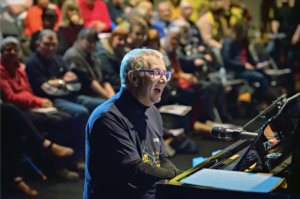
Curators selected the title of the festival based on the statistic that someone in the UK develops dementia every three minutes. Every Third Minute: a festival of theatre, dementia and hope, ran from 9 February to 31 March 2018. The seven-week Festival, attended by over 7,500 people, was made up of 12 productions (in-house and visiting artists/companies) including three new plays co-written by people living with dementia, four training programmes, 16 workshops and a tour of performances in care homes.
Evaluation was carried out with audience members and participants and is discussed in detail in the evaluation report (Taylor and Hughes, 2019): ETM_Spreads_Webversion_Linked.pdf (leedsplayhouse.org.uk)
The process of creative co-production with the Festival Curators was investigated in academic research conducted by Nicky Taylor as the basis of her doctoral study. Publications are forthcoming.
The impact of the Festival has been significant on the Curators, who developd new skills, social connections and personal growth through their involvement. Continued co-production work with the Curators is ongoing beyond the festival.
“We had a voice” – Curator
“It’s like building up muscles, using our skills, getting braver” – Curator
“I realised I still have skills to offer, that I haven’t used since I was working” – Curator
Positive feedback from audiences, artists and participants indicated that the festival opened up conversations, and changed perceptions about dementia, towards more informed and hopeful outlooks.
“It made me feel hopeful for people living with dementia, their life isn’t over it is just different” – audience member
“I have now told many people – friends and work colleagues – about my dad’s condition – something I’d found difficult to bring up in conversation before. His involvement was a good platform to open up conversation about dementia” – family supporter
The approaches of the festival continue to impact on the day-to-day activity of Leeds Playhouse, demonstrating a notable ripple effect. Since the festival people with dementia have engaged in co-creating another major production – Maggie May – in line with the theatre’s dementia friendly approach, which results in greater inclusivity for everyone.
“I understood the subject intellectually before, but now I understand it emotionally better” – audience member
Every Third Minute was funded through a Celebrating Age grant from Arts Council England and The Baring Foundation and was supported by Leeds City Council, The Liz & Terry Bramall Foundation, Irwin Mitchell Solicitors, Skipton Building Society, Winston Churchill Memorial Trust, NHS National Institute for Health Research and Join Dementia Research.
Note: In June 2018 the organisation’s name was changed from West Yorkshire Playhouse to Leeds Playhouse
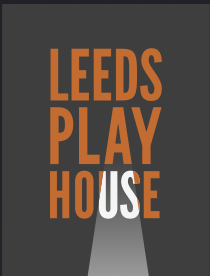

Hamari Yaadain – which means ‘Our Memories’ in some South Asian languages – is a memory café for people from South Asian backgrounds. The café has been running since 2010. Weekly support and activities are offered in English, Punjabi, Urdu and Hindi. The café is run by Touchstone and led by Ripaljeet Kaur to address the specific needs of people affected by dementia and their carers from South Asian backgrounds, who are underserved by mainstream dementia services.
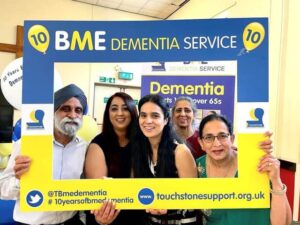
‘It’s run in their mother tongue so people feel comfortable. It’s the only group that most of them go to, because of the language and the culture. It’s about bringing people together and making them feel more comfortable talking about the issues they are facing.’ – project leader
Weekly sessions encourage people to talk openly about dementia – a condition that is stigmatised and misunderstood. A range of approaches are used to engage participants, and the arts play a vital role in this. Group members have written their own song and a short play in partnership with artists and partner organisations. Dance, reminiscence and music sessions offer physical and mental stimulation. Other opportunities include pottery painting sessions and visual arts which have shown Increased concentration, focus and positive mood. Participating in arts activities is a regular event, where people with dementia and their carers can gain confidence and take part together.
‘We used to feel lonely – loneliness is a big disease. But coming here and meeting other members helps bring memories back. The group is like a family. I find it very helpful coming here. The staff speak our language, they understand.’ – participant
‘When we come in, she’s a bit on the low side. But we spend two hours here and her mood changes. She finds it especially enjoyable when the group does something together.’ – family carer
Refreshments are offered and conversation is encouraged. Since the COVID pandemic participants are able to join meetings either in-person or online, as the two are now blended.
Beyond the weekly meetings, the café’s members and staff have made a positive impact in the local and national dementia community, as advocates for greater awareness of the needs of minoritised communities.
One day a week for fifty weeks a year, formerly lonely older people meet in the heart of the Albany building to work alongside artists and have the opportunity to uncover the artist within themselves. Participants are just as likely to be suspended on silks in a circus workshop, enjoying a performance of jazz, creating sculpture, writing poetry or singing in the weekly choir.
Meet Me At… grew out of a simple question shared by the Albany and Entelechy Arts:
‘What if isolated and lonely older people had the opportunity to go to an arts centre instead of a day centre?’
Meet Me at the Albany (MMATA) is an arts and social club for over 65s in the heart of Deptford, London.
Since 2013 the project has grown far beyond the weekly club at the Albany. We have worked in partnership with Lewisham Homes running creative sessions for residents in a number of their Independent Living Schemes across the borough and we’ve created poetry exhibitions and mini-gigs with residents. We have led the Rage Against the Machine festival, challenging peoples perceptions of elders in our communities.
We host a film club. Meet Me at the Movies where we have cinema screenings for and chosen by older people. For cultural destinations there is Meet Me on the Move: monthly trips across London, from the Houses of Parliament to the Royal Festival Hall.
Our programme innovated and evolved during lockdown and we run weekly creative groups on the phone, our Cluster Calls, so our members can join from the comfort of their own homes. And recently a poetry collective has been forming. Out of the pandemic we created Meet Me on the Radio with our members, and you can listen to all our previous episodes here. It has been an incredible space for older people’s voices and opinions to be heard by an audience of 1000’s across the world!
MMATA is supported through grants, trusts and foundations, weekly subs from members who can afford to and individual one off donations. It wouldn’t be able to run and offer the care it does to so many members without the fantastic team of volunteers. Volunteers support all aspects of the programme including introducing isolated older people to creative activities. Volunteers also get so much out of being part of the project, developing creative, social and practical skills.
MMATA is brilliant thanks to the level of care, support and consistency of the programme. Individual needs and access support requirements are addressed and we pride ourselves on a warm welcome. It is a unique space for elders, who wouldn’t see themselves as artists, to work, experiement and collaborate with talented artists, muscians and makers across all art forms. Creating high quality artworks and performances.
‘It isn’t just a club it is an experience’ MMA Member J
Our Big Meetings are spaces for us to ensure members voices are at the heart of the Meet Me programme, they steer and guide the artists, projects and experiences we work with, alongside the knowledge and expertise of the staff team and being hosted in a world class arts centre.
Before, during and after covid we know our programme has brought people together and ensured those more isolated can stay connected with others, to meet old friends and make new ones. We know the creative activities, from painting, to singing, to movement and dance, has had a positive impact on people’s mental health as well as their physical wellbeing. We have kept people moving and active beyond the comfort of their homes (whether that is in person or through the phone line). The programme has been key in building people’s confidence in getting back into the world after a challenging time.
‘Meet me is a very important part of our lives, meeting people, getting together, communicate with each other…makes you feel relaxed at this time of need…with this recession it makes me feel low, but you get to Meet Me and you feel comfortable and can explain and hear different points of view, we listen to each other in a time of need….I feel very very happy when I get to that community there…’ MMA Member J
Across our varied programme we deliver between 15 – 20 sessions every month and 50 – 70 members are regularly involved in creative activities with more people being referred to our programme every week.
New members discover and join us in many different ways including through self referrals, referrals through family or friends or through social prescribing (find out more about Entelechy Arts recent Thriving Communities project here), and when we go out and about to visit local groups and community spaces.
The Albany has just been awarded accreditation as part of the London wide, Dementia Friendly Venues Charter and will continue to review and adapt access in our building and as part of our online presence to ensure it is more accessible for all of those people living with Dementia and their carers.
A partnership project between the Albany and Entelechy Arts.
Meet Me at the Albany project producer is Sophie Merriman. – Sophie(dot)merriman(at)thealbany(dot)org(dot)uk
Meet me on the Move and Meet Me at the Movies project lead Roxanna Kennedy. – roxanna(dot)kennedy(at)entelechyarts(dot)org
For further information
Facebook: @EntelechyArts AND @Albany.Deptford
Twitter: @EntelechyArts AND @theAlbanySE8
Instagram: @entelechyarts AND @thealbanyse8
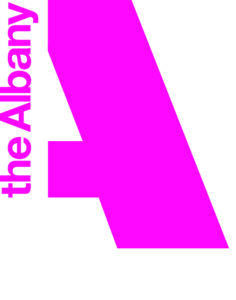
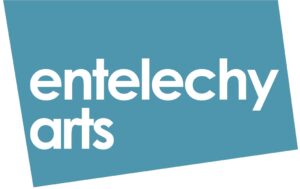
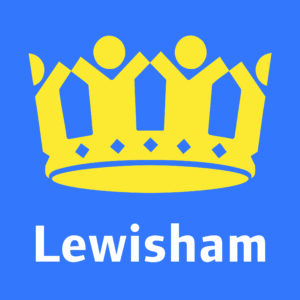

An artistic residency to reveal the ‘real world of the care home’ by two artists – Claire Ford and Kate Sweeney – at Northbourne Care Home, Gateshead.
Claire and Kate lived in the care home for five weeks. They created a studio space to make digital and visual art with residents and staff in a disused part of the care home.
The project aimed to:
- Understand the effects of living in a care home and reflect on these feelings as artists
- Create strong relationships with the staff and families to integrate this way of working and to promote sustainability
- Change perceptions of dementia and what is actually happening inside care home environments
- Provide an ongoing creative output for residents over a month period and to see the differences from beginning to end
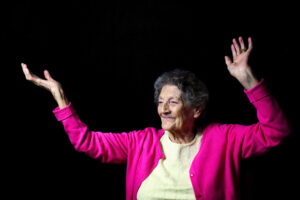
Numerous opportunities were created within the project. For example, an exhibition of knitted envelopes was shown in the local community and people were encouraged to send postcard replies to residents. A huge number of postcards were received.
“It just goes to show how much people do want to reach out and how much institutions have these invisible, and sometimes real, walls around them that keep communities separate.” – artist
The artists made casts of the hands of care staff to highlight both the physical and the emotional work they constantly undertake.
“The emphasis for care and love and kindness falls on the staff. Emotional labour is often hidden.” – artist
The residency opened up knowledge and confidence in artistic activities within the care home team, as working with the artists provided training and learning opportunities.
“Dementia has a lot of strangeness in its sentences that don’t quite make sense, but there’s gaps in those sentences that can be quite beautiful, quite resonant, quite powerful to hear someone. And so maybe art allows a space for that, whereas the real world doesn’t know how to deal with it.” – artist
The positive impact of the artists’ residency was noticed by family and staff members.
“I’ve never known my mum as settled and as happy. And that’s what they need isn’t it, to keep them stimulated?” – family member
“They’ve expressed themsleves in different ways to just talking, and especially those with dementia, it’s unlocked a lot of things.” – care staff
The Moving In residency took place in the annexe of Northbourne Care Home, an unused space that was closed due to it not meeting regulations for en-suite bathrooms. During the residency the annexe was developed into a studio space, changing daily with creative outcomes and artworks. Staff, residents and family members visited the artists and began using the space. The final Moving In exhibition (December 2017) transformed the space into a professional arts space in which care home directors saw its full potential. The annexe at Northbourne is now ‘The Hub’ – a community space with a hairdresser, a men’s shed, a kitchen for residents to use, an art studio and a cinema room. A real transformation that brings great energy to the space.
Funded by Arts Council England in collaboration with Equal Arts and Anchor Care Homes.
Further information:
Claire Ford and Kate Sweeney
Claire(at)claire-ford(dot)co(dot)uk
Thumbprod(at)Hotmail(dot)com

The Dementia Inclusive Singing Network helps people affected by dementia take part in singing groups and choirs across Scotland. Research shows that singing is good for you and singing with a group is even better.
“Singing is good for you… and group singing is even better.” (Voices Now, The Big Choral Census, July 2017). Dementia Inclusive Singing Netowork wants to share this with as many people as possible!
DISN grew from the Luminate, the development agency for creative aging in Scotland. It adapts lots of learning from Luminate. Namely the need to inspire through creativity, and use that excitement to build capacity. Partnership and collaboration is critical. Health and Cultural sectors are connected. Live events and training tools are linked as part of strategic development. Free resources available online. It is a networked approach.
At a time when lots of older people are at home more or in care homes having to isolate, the network set out to help find ways for people to connect and sing together.
If you, or someone you know, would like to sing with a group, the network will help you find opportunities. If you are a song leader or organiser, the network offers training and networking opportunities. If you would like to support people affected by dementia, or work in a care or community setting and would like to deliver dementia inclusive singing sessions, you can now join our network by completing a short online form.
The network then offers help in three areas
- Finding a group.
The online forma help people to find a group by location. Thye also allow you to register your own group, so the network can continuously expand.
- Leading a group.
The networks addresses the practical and musical needs.
Firstly an education function to improve awareness of alzehimers and dementia amongst singing group leaders. This includes information on communicating with people, in person or by print or planning a session. At the same time it seeks to reduce misinformation and stigma.
Secondly the musical aspect. The website offers repertoire built from Scottish musical forms, and the type of music older people in Scotland may be used to singing in groups. Easily understood lyrics, songsheets and scores along with video guides.
- Sing at home
The programme was developing in person and then covid impacted. This led to a need to work for people who were isolated at home. The lasting benefit of this crisis is that the project is building supports that can assist people living with alzheimers and their carers if they are housebound.
On the website some songs are broken down into their constituent parts – song words, notated music, a piano accompaniment, films and recorded music for the song. It makes it easy to adapt to home.
Dementia Inclusive Singing Network offers a useful model for other countries and singing traditions. Many of the tools required (songs, lyrics, music, recordings) or education (information about dementia and alzheimers, how to lead inclusive sessions) are already available. DISN genius is in connecting across disciplines to bring what is already in existance to those who can most benefit, primarily by bridging between worlds of culture and creativty and social care.
https://singing.luminatescotland.org/
During Covid-19, String of Hearts developed a music phone calls service ‘the Music Hotline’ to support people without internet access, which is now being socially prescribed by GP practices and healthcare providers across Trafford and Manchester.
The Music Hotline was created with three things in mind: connection, creativity and self-expression. Born out of barriers to accessing creative activities without the internet, the calls enable older adults to engage in music-making using only the telephone.
Data captured by Ofcom shows that over a third of people in the UK aged over 65 don’t use the internet, which is causing a digital divide as more and more services are delivered online. This was reinforced through conversations with social prescribing link workers whose caseloads of older adults experiencing social isolation, bereavement and long-term health conditions have increased.
Older people are referred to String of Hearts by GP surgeries, NHS Trusts and other healthcare providers. Every fortnight, a String of Hearts musician rings each individual to explore their musical interests, sing and write poetry or lyrics. The musicians respond organically to each person’s taste in music and improvise tunes in the moment. This music phone call model is accessible for people with sight loss and people with chronic anxiety or depression, who can participate over the phone without the pressure of joining a group, at a time agreed with them.
To date, String of Hearts has received over 90 social prescribing referrals and delivered over 600 music phone calls for older adults in Trafford and Manchester. The phone calls are continuing today for people who are housebound and unable to attend activities in person.
To measure the difference the Music Hotline makes, evaluation is embedded in the service through one-to-one interviews, observation logs and feedback from social prescribing link workers, with data demonstrating improved wellbeing, connections and creativity for older adults.
The music phone calls have provided a sense of purpose and lifted spirits: “I’ve enjoyed it very much. Keeps me focused, lifts your spirits, I love it so much”. Individuals are able to express their thoughts, feelings and ideas: “It’s hard to keep enthusiasm alive when there’s no human contact; it’s hard to manufacture it yourself. I look forward to these telephone calls, it’s a lifeline to the outside world, with someone who has shared interests… It’s wonderful therapy for the soul and for your physical body”.
Participants have developed their creativity during the phone calls, with several writing their own poems and songs: “It’s a talent that I can work on myself”. In 2021, String of Hearts musicians and participants curated this music into an album called ‘Spotlights’ to shine a light on the creativity of older adults who were hidden during Covid-19.
String of Hearts has received national recognition for its involvement in music and social prescribing from The Independent, ITV News, BBC Radio, Culture Health & Wellbeing Alliance and the British Society of Gerontology.
The Music Hotline has been supported by grant funding from Greater Manchester Integrated Care Partnership, Trafford Council, Trafford Housing Trust, J T Blairs Charity and the National Lottery Community Fund, as well as donations from individuals. More recently String of Hearts has also received social prescribing funding from the Be Well Service and the National Academy of Social Prescribing, with the aim of demonstrating the value of investing in creative activities as part of health and social care to support people to live well in later life.
In the words of social prescribing link workers from North Trafford Primary Care Network:
“The positive impact for all those who have engaged on their mental health has far exceeded expectations. This has often included hard to reach patients especially during the pandemic when String of Hearts were quick to adapt to the needs of the community and establish a music telephone hotline when face to face was not possible. We continue to refer patients into the String of Hearts service on a regular basis, and are so grateful for all the great work that they do to help promote a happier and healthier community.”
Website: www.stringofhearts.co.uk
Blog: https://www.culturehealthandwellbeing.org.uk/news/blog/guest-blog-string-hearts-lucy-geddes-and-amina-hussain
Articles:
https://www.itv.com/news/granada/2021-11-07/elderly-residents-produce-an-album-after-writing-songs-in-lockdown-phone-call
https://www.independent.co.uk/arts-entertainment/music/features/music-dementia-studies-therapy-b1955954.html
For further information:
Lucy Geddes, Co-Director, String of Hearts CIC
INFO(at)stringofhearts(dot)co(dot)uk
https://www.thebeestonstudio.uk
The Studio’s approach is informed by the latest research, and in keeping with guidance on the care of people with dementia from the National Institute for Health and Care Excellence (NICE, June 2019). NICE recommends activities such as exercise, art, gardening, baking, music, conversation and animal assisted therapy to help promote wellbeing in dementia.
We offer a varied programme of individual and group activities led by professional facilitators.
The Studio is ‘a place to create and connect’, where people can try out new skills or practise familiar leisure activities. Carers may come along, if they wish, or take time out from caring, confident that the person with dementia is enjoying excellent care in a stimulating environment. The Studio’s model has been developed using community consultation and based on evidence from research.
We always start the day with seated exercises, because of the importance of fitness and flexibility as we age. We then follow with games of throwing and catching to promote physical co-ordination. We then all enjoy a drink and a snack before continuing the session with an arts based activity.
Each month has a theme, and each session has several different activities relating to that theme. The people who enjoy coming to The Studio for day-care have a wide range of interests that we aim to include through planned activities. The methods used include conversation, reminiscence, digital resources, storytelling, paint, collage, sculpture, crafts, music, singing and poetry.
There is always lots of laughter and the small groups get to know each other well. In total the day-care session is three hours long. The clients pay a fee per session to attend.
An example programme for a session:
Theme- colours
10:00am Meet and greet with clients and general catch-up
10:10am Seated exercises
10:40am A game of boules
11:00am Drink and a snack along with a general discussion about the theme colours including how colours make the clients feel, asking the clients their favourite colours
11:30am Activity- Using water colours to paint a rainbow
12:00pm Sing-along- colour themed songs
12:30pm Poetry readings- colour themed
1:00pm Finish
We keep the day-care personalised and improvise with alternate activities for clients to participate in if they are not enjoying or engaging in the main scheduled activity. For example, if a client does not want to participate in painting they can still engage in the conversations and do something that they prefer such as petting the robotic therapy pets. It is important that no client feels forced to carry out an activity.
The Studio is assessed using verbal feedback from the carers of the clients who attend the session, and any feedback is always taken onboard to improve the service. We value input from the carers and build up a relationship with them so they know they feel that they can always come to the staff if they need extra support or advice.
Involving patients and members of the public as active agents in the development and delivery of health care research has proved to be beneficial for all involved. Indeed, patient and public involvement (PPI) is now commonplace across the United Kingdom in both research and healthcare delivery settings.
Unfortunately, traditional models of communication and consultation commonly used by PPI practitioners are often unsuitable for individuals living with cognitive impairments such as dementia. Long presentations, multi-stage working groups and workshops spread over significant time periods can play against the strengths of those living with dementia, instead relying on cognitive skills which may be impaired. It’s important to recognize that despite the deficits brought about by dementia, many cognitive skills remain intact and, if given appropriate support, those living with dementia are more than capable of contributing to such work. Therefore, we have piloted a novel approach to PPI, tailored towards individuals with cognitive impairments, who lack traditional cognitive and verbal fluency.
The Workshop:
Aims
- To engage people living with dementia and their carers in current dementia research, specifically through presentation of a small ‘bite size’ overview of a current research project. – Achieved verbally, using relevant images.
- To foster discussion around this topic in a safe, failure free and creative environment. Empowering individuals living with cognitive impairment to contribute to the discussion.
- To evaluate the feasibility of utilizing this process on a larger scale to communicate research aims and outcomes with individuals living with cognitive impairments.
Attendees and facilitators:
- 4 x facilitators, including:
- PPI expert who led on setting up the workshop and keeping to time, Dr Sarah Fox
- Chief executive at Age UK Trafford, who was familiar to those living with dementia and their carers, Ms Ann Marie Jones.
- Expert in poetry and communication, Dr. Sam Illingworth
- Old age psychiatrist and clinical director of the Greater Manchester Dementia Research Centre, Dr Ross Dunne.
- Attendees:
- 2 x people living with dementia
- 2 x people with a diagnosis of MCI
- 3 x Carers.
Set up
- We hosted our workshop in a familiar venue for those living with dementia, in this instance this was an Age UK venue, specifically in the same room where those participating in the workshop regularly met for a dementia café.
- We scheduled 15-20minutes at the start of the workshop for tea and biscuits. During this time both participants, facilitators and researchers were encouraged to get acquainted with each other.
- Dr Dunne launched the session with a short (15 minute) discussion of how Alzheimer’s pathology (amyloid) can be visualized in the brain and used as an early warning/risk indicator. Dr Dunne’s presentation was largely visual and conversational, avoiding acronyms or technical language.
- Dr Illingworth then presented 3 well known poems, using these as a starting point to encourage open and creative conversations surrounding the major points of Dr Dunne’s talk, including the benefits of early diagnosis and the brain images he showed. During these conversations all facilitators took part in discussions and Dr Illingworth collected comments and quotes from participants.
- Finally, Dr Illingworth presented a poem he created based on the conversations from the previous session and we gathered feedback on the workshop.
Evaluation:
Question 1: Did this method create output which reflected individual’s feelings and understanding of the research topic under discussion?
The poem which emerged from this workshop touched upon several aspects of Dr Dunne’s presentation: including the impact of dementia on the individual, the process of receiving a diagnosis, the desire for open honest discussion about diagnosis and research, and a reflection on the images shown during the presentation.
The poem (below) touched on many important points and reflected well the topic under discussion:
Hitting the Ball onto the Wrong Fairway
My mind isn’t technical,
I can’t make two words rhyme;
They measure the brain size,
There’s no needle too fine.
This is my mantra:
Can you find out more about that?
Being able to talk about it,
Is as important as fact.
I don’t think I’d want to know
Not without a cure,
I’ve lived under dementia’s shadow
For 16 years or more.
And who would decide this,
Would you ask your GP?
How are people selected,
Is this really for me?
Sometimes when I forget I say:
I’ll suck the pill before I give it to you.
This one looks like a mushroom
This one looks like a moth,
When I looked at the images
I thought that this one looked more alive,
And I suppose that they are really:
Free of any inhibition.
Question 2: What did attendees gain from the session?
Words used by participants to describe the event:
- Positive
- Informative
- Hopeful
- Enjoyable
- Funny
- Friendly
- Hope for the future.
Extra comment:
- “this is the best it’s [dementia] ever been explained to me”
Reflection from Age UK representative who helped recruit participants for the event:
Branding the event as a poetry workshop might be off-putting for some people – i.e. they might be worried about having to write their own poems. This should be considered when advertising future workshops.
Reflection:
Overall, the event was a success, reviewed positively by participants and producing a poem which was reflective of the issues raised by Dr Dunne’s presentation.
Keys to success:
- Creating a less formal environment and allowing time for relaxed discussion:
- Hosting at a familiar venue and alongside familiar staff.
- Encouraging conversation and ‘getting to know you’ time at the start of the workshop.
- Ensuring technical content was presented in an accessible ‘conversational’ style, focusing on aspects of topic relevant to patients, i.e. benefits of early diagnosis and including interesting imagery.
- Working with a creative professional to capture discussion and create resulting poem.
- Encouraging group ownership of resulting poem and pride in its development.
Learning points:
- Recruitment for the workshop was challenging, this may have been due to concern over participants needing to create their own poems. For future events it should be made clear that this is not an expectation of the workshop.
